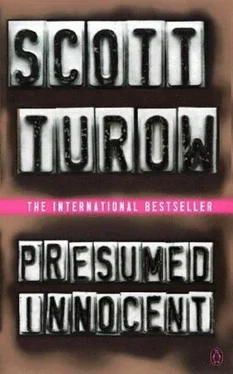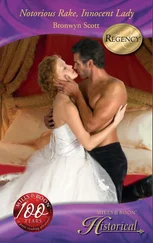Scott Turow - Presumed innocent
Здесь есть возможность читать онлайн «Scott Turow - Presumed innocent» весь текст электронной книги совершенно бесплатно (целиком полную версию без сокращений). В некоторых случаях можно слушать аудио, скачать через торрент в формате fb2 и присутствует краткое содержание. Жанр: Детектив, на английском языке. Описание произведения, (предисловие) а так же отзывы посетителей доступны на портале библиотеки ЛибКат.
- Название:Presumed innocent
- Автор:
- Жанр:
- Год:неизвестен
- ISBN:нет данных
- Рейтинг книги:4.5 / 5. Голосов: 2
-
Избранное:Добавить в избранное
- Отзывы:
-
Ваша оценка:
- 100
- 1
- 2
- 3
- 4
- 5
Presumed innocent: краткое содержание, описание и аннотация
Предлагаем к чтению аннотацию, описание, краткое содержание или предисловие (зависит от того, что написал сам автор книги «Presumed innocent»). Если вы не нашли необходимую информацию о книге — напишите в комментариях, мы постараемся отыскать её.
Presumed innocent — читать онлайн бесплатно полную книгу (весь текст) целиком
Ниже представлен текст книги, разбитый по страницам. Система сохранения места последней прочитанной страницы, позволяет с удобством читать онлайн бесплатно книгу «Presumed innocent», без необходимости каждый раз заново искать на чём Вы остановились. Поставьте закладку, и сможете в любой момент перейти на страницу, на которой закончили чтение.
Интервал:
Закладка:
Morrie Dickerman comes to the witness stand. The pure professional. An angular New Yorker with large, darkframed glasses, Morrie finds fingerprints fascinating. He used to like me because I would sit there and listen to him. Morrie is as good as Painless Kumagai is bad-the kind of grab bag of abilities you encounter in public service. He sits there with his photographs and slides and shows the jury how it is done. He explains how prints are made, a residue of oils left by certain persons, at certain times. Some people don't ever leave prints. Most people will leave prints at some times and not at others. It depends on how much they sweat. But when they leave a print, it is unique. No one fingerprint is like any other. Morrie lays all of this out in his openhanded way, then nails my butt to the barn door in the last five minutes of his testimony with his pictures of the bar, the glass, the lifts, and enlargements from my county employee's file card. All the matching points of comparison have been identified with red arrows. Morrie, as usual, has prepared well.
Stern spends some time on his feet, studying the photographic blowup of one of my fingerprints from the glass before he begins. He turns the picture toward Morrie.
"What time on April first was that fingerprint made, Mr. Dickerman?"
"I would have no idea."
"But you're certain it was made on the first of April?"
"No way to tell that, either."
"I'm sorry?" Stern draws his mouth downward in mock surprise. "Well, certainly you can tell us that it was made around April first?"
"No."
"Well, how long can fingerprints last?"
"Years," says Dickerman.
"I'm sorry?"
"It can be years before the oils break down."
"What is the oldest fingerprint you have taken in all the time you have worked for the police department?"
"In a kidnapping case, I took a fingerprint off the steering wheel of an abandoned car that had to be three and a half years old."
"Three and one half years?" Stern makes a sound. He is a marvel. The man who laid waste to Raymond Horgan now feigns gentle-spirited befuddlement, deference to the expert. He acts as if he is slowly figuring all of this out as he goes. "Then Mr. Sabich could have handled this glass six months earlier when he was at Ms. Polhemus's apartment in connection with the McGaffen trial?"
"I can't tell you when Mr. Sabich handled it. I can tell you it has two of his fingerprints. That's all."
"Suppose Mr. Sabich had touched it for some reason-merely had an unnoticed drink of water, or only the interior of the glass had been rinsed after he used it-is it possible that his prints would remain?"
"Yes. And by the way, it is theoretically possible that the entire glass could have been immersed. Usually soap and water will remove the oils, but there are cases, in the literature where fingerprints have been identified even after the object was rinsed in soap and water."
"No," says Sandy Stern in wonder.
"I've never seen that," says Dickerman.
"Well, at least we know that no one else handled the glass, because there were no other fingerprints on it."
"No."
Stern goes still. "I'm sorry?"
"There's another latent."
"No," says Stern again. He is laying it on self-consciously. There is an odd theatricality to Sandy. Early in the trial the jury had not seen him enough to know that he was acting. Now in our second week, he is more broad in some gestures, as if to acknowledge the deliberateness of his behavior. I know and you know, he is saying to them. An act of confidence. So they understand that he is not really trying to put anything past them. "You mean there is another fingerprint on the glass?"
"That's what I mean."
"Could it be, sir, that Mr. Sabich touched the glass months before, and someone else handled the glass on April first?"
"It could be," says Dickerman evenly. "It could be anything."
"Well, we know Mr. Sabich was there that night because his prints are on many other objects in the apartment, are they not?"
"No, sir."
"Well, there must be some things. For example, the window latches were opened. Were there identifiable prints there?"
"Identifiable, sir. But not identified."
"These were the fingerprints of someone, but not Mr. Sabich?"
"Or Ms. Polhemus. We excluded her."
"A third person left those prints?"
"Yes, sir."
"Just as with the glass?"
"True."
Stern goes through the entire list of locations within the apartment from which lifts were taken without discovery of my prints. The coffee table that was upset. The fireplace tools printed with the thought that one might be the murder weapon. The surface of the bar. The cocktail tables. The window. The door. Five or six other places.
"And Mr. Sabich's prints appeared in not one of those places?"
"No, sir."
"Only on this glass that can no longer be found?"
"Yes, sir."
"One place?"
"That's all."
"He would have left prints throughout the apartment had he been there, would he not?"
"He might have. He might not have. Glass is an unusually receptive surface."
Stern, of course, knew the answer.
"But the table," asks Stern, "the windows?"
Dickerman shrugs. He is not here to explain. He is here to identify fingerprints. Stern makes the most of Dickerman's inability and, for the first time since we started, looks directly to the jury, as if for consolation.
"Sir," says Stern, "How many other identifiable prints were there of a third person, not Mr. Sabich, not Ms. Polhemus?"
"Five, I think. One on the latch. One on the window. A couple on the liquor bottles. One on a cocktail table."
"And are any of those made by the same person?"
"I wouldn't know."
Stern, who has still not left the side of the defense table, bends forward a bit to indicate that he does not understand.
"I'm sorry?" he says once more.
"No way to tell. I can tell you whoever it is has not been printed by the county, because we did a computer run. They don't have a criminal record. They haven't worked for the county. But they could be five different people or the same person. It could be the cleaning lady or a neighbor or some boyfriend. I can't tell you."
"I don't understand," says Stern, who understands very well.
"People have ten fingers, Mr. Stern. I don't know that unknown A isn't the index finger, and B is the third finger. Plus left hand and right hand. There's no way to tell without knowns to work from."
"Well, certainly, Mr. Dickerman-" Stern stops. "Which prosecutor supervised your activities after Mr. Sabich?"
"Molto," says Dickerman. You get the feeling at once that Morrie does not care for Tom very much.
"Well, certainly he asked you to compare these five unidentified prints to see if two of them might be from the same finger?"
Very good, I think to myself. Excellent. This is the kind of detail that I always overlooked as a prosecutor. I thought about the defendant, and the defendant of course thought about everybody else.
But when Dickerman answers, "No, sir, he did not," one of the jurors, the part-time computer jock, turns away shaking his head. He looks straight at me, like, Can you believe this? I am astounded that we have come back so far from yesterday. The juror turns to the person beside him, the young woman who runs the drugstore, and they exchange remarks.
"It can be done overnight," says Dickerman.
"Well, I'm sure," says Stern, "that Mr. Motto may remember now." Stern is about to sit down. "Do you know, Mr. Dickerman, why Mr. Molto did not ask you to make that comparison of the other prints?" A good trial lawyer never asks why, unless he knows the answer. Stern does, as I do. Neglect. Too much to do and not enough time to do it. The problem of focus. Any answer will suffice to raise doubts about Molto.
Читать дальшеИнтервал:
Закладка:
Похожие книги на «Presumed innocent»
Представляем Вашему вниманию похожие книги на «Presumed innocent» списком для выбора. Мы отобрали схожую по названию и смыслу литературу в надежде предоставить читателям больше вариантов отыскать новые, интересные, ещё непрочитанные произведения.
Обсуждение, отзывы о книге «Presumed innocent» и просто собственные мнения читателей. Оставьте ваши комментарии, напишите, что Вы думаете о произведении, его смысле или главных героях. Укажите что конкретно понравилось, а что нет, и почему Вы так считаете.












